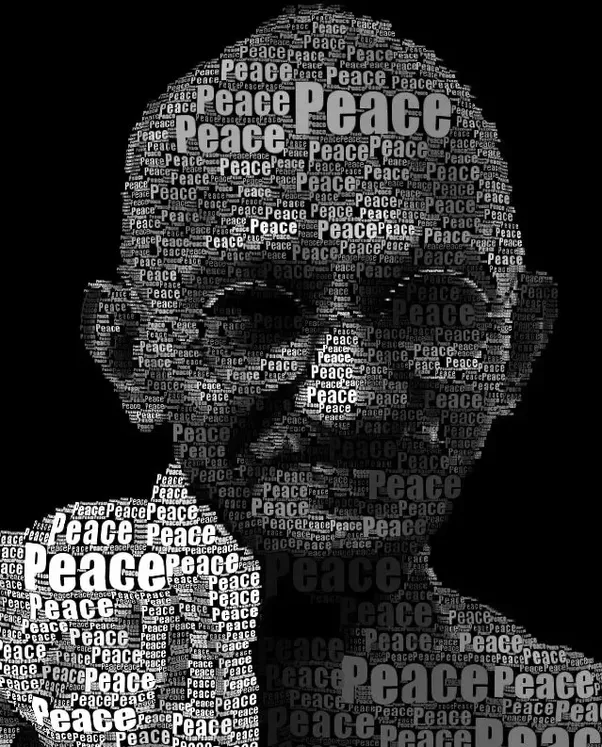 1 man who used 1 word to shape his lifehttps://qph.fs.quoracdn.net/main-qimg-7723ada2991799c8fea4846e21fb6ffdA Hero’s Work
1 man who used 1 word to shape his lifehttps://qph.fs.quoracdn.net/main-qimg-7723ada2991799c8fea4846e21fb6ffdA Hero’s Work
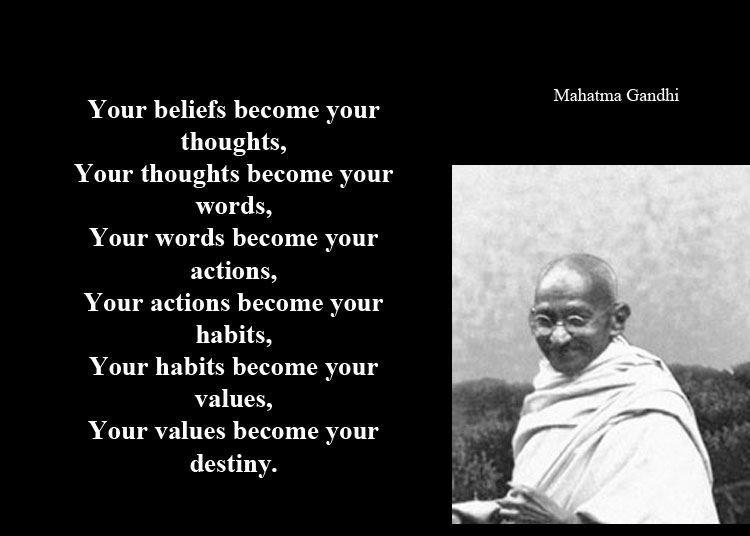 Gandhi's moral empowerment continues to be present in today's worldhttps://moralupbringing.files.wordpress.com/2016/11/mahatma-gandhi-quotes-your-values-become-your-destiny.jpg“Heroes arrive when we need them most. They define us and point us in a direction. To turn our sights at this moment toward an idea of America that is heroic does, admittedly, require an act of will” (Granger 1). David Granger, in his article “Boy, Do We Ever Need A Hero,” explains how our heroes shape our idealistic actions while also leading us to form common misconception of what a hero is in today's society. He illustrates that heroes “point us in a direction.” The hero he describes is, however, far from the heroes we commonly encounter in today’s materialistic world. We look up towards those who have encountered monumental success in the form of wealth and beauty, and we as a whole choose to ignore the astringent words or actions they may have performed on their adversaries. Yet, all hope for the crusade of a true hero cannot be lost. A few have paved their way onto the stage of heroism without invoking rage and jealousy as their main weapons. They instead choose the path of love and compassion to be their driving force in the heat of battle. They summon immense courage in the face of danger, a trait derived from their vast and ample knowledge of the true meaning of life. Philosophers have pondered the meaning of life for countless years. However, they still have not found the answer to their question. But, true heroes immediately find their purpose in life, from the second they start to change the world. They represent the pinnacle of a new modernistic age of the human race. Yet, they posses no ego nor personal agenda derived from their past accomplishments, they rather strive to uplift the standards of human society through their courage and compassion. These heroes expand their sympathetic reach onto those whose lives were impacted by tragedy, uplifting them to develop and mature into idealistic people, which is only possible due to their courage and compassion. By doing so, they revolutionize the future of the human race by instilling high values and morals into the minds of their critics and supporters through their benevolent and gallant legacies.
Gandhi's moral empowerment continues to be present in today's worldhttps://moralupbringing.files.wordpress.com/2016/11/mahatma-gandhi-quotes-your-values-become-your-destiny.jpg“Heroes arrive when we need them most. They define us and point us in a direction. To turn our sights at this moment toward an idea of America that is heroic does, admittedly, require an act of will” (Granger 1). David Granger, in his article “Boy, Do We Ever Need A Hero,” explains how our heroes shape our idealistic actions while also leading us to form common misconception of what a hero is in today's society. He illustrates that heroes “point us in a direction.” The hero he describes is, however, far from the heroes we commonly encounter in today’s materialistic world. We look up towards those who have encountered monumental success in the form of wealth and beauty, and we as a whole choose to ignore the astringent words or actions they may have performed on their adversaries. Yet, all hope for the crusade of a true hero cannot be lost. A few have paved their way onto the stage of heroism without invoking rage and jealousy as their main weapons. They instead choose the path of love and compassion to be their driving force in the heat of battle. They summon immense courage in the face of danger, a trait derived from their vast and ample knowledge of the true meaning of life. Philosophers have pondered the meaning of life for countless years. However, they still have not found the answer to their question. But, true heroes immediately find their purpose in life, from the second they start to change the world. They represent the pinnacle of a new modernistic age of the human race. Yet, they posses no ego nor personal agenda derived from their past accomplishments, they rather strive to uplift the standards of human society through their courage and compassion. These heroes expand their sympathetic reach onto those whose lives were impacted by tragedy, uplifting them to develop and mature into idealistic people, which is only possible due to their courage and compassion. By doing so, they revolutionize the future of the human race by instilling high values and morals into the minds of their critics and supporters through their benevolent and gallant legacies.
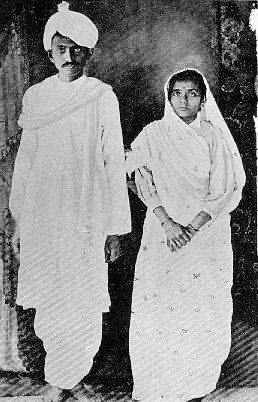 Gandhi and his wife Kasturbahttps://www.kamat.com/mmgandhi/mkgwed.jpg
Gandhi and his wife Kasturbahttps://www.kamat.com/mmgandhi/mkgwed.jpg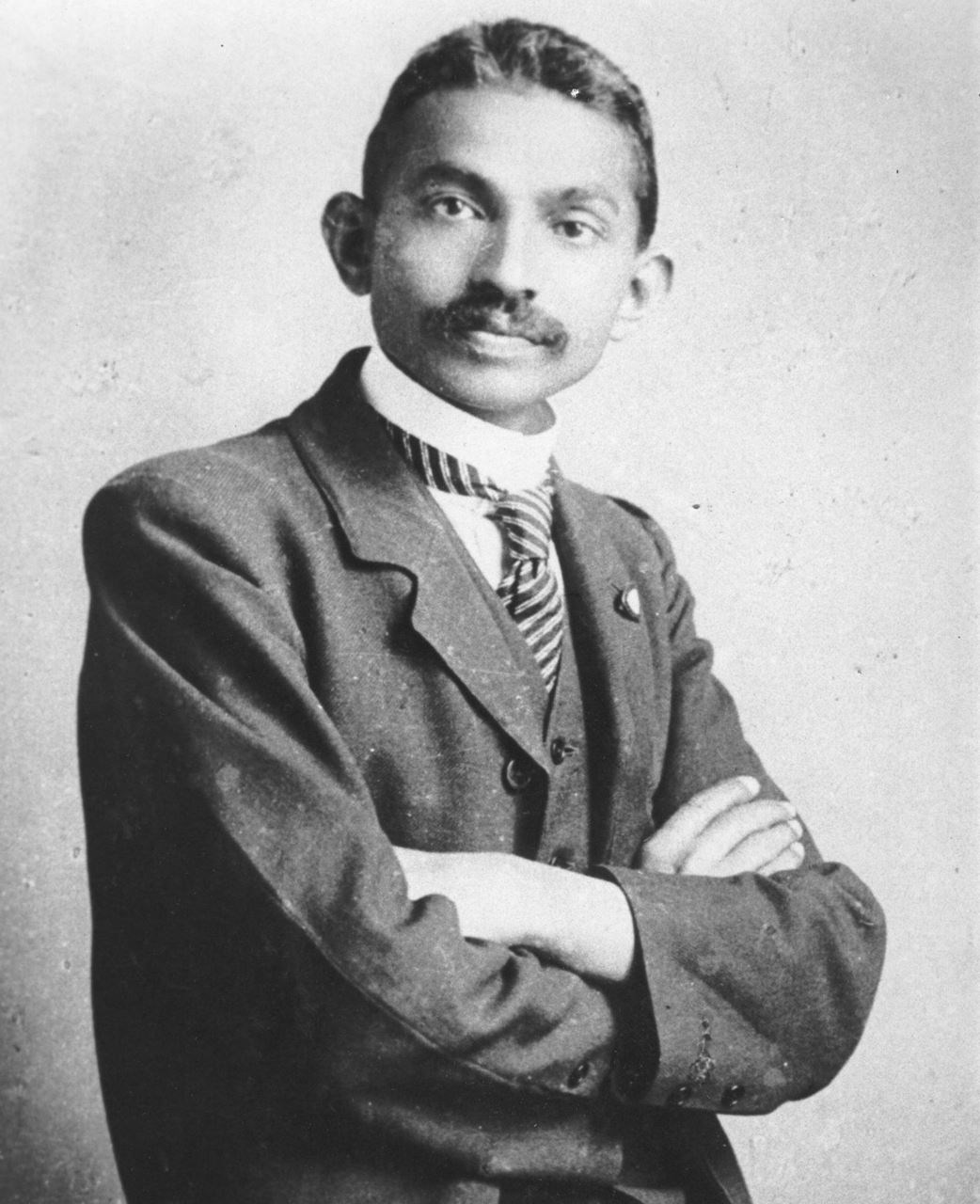 Gandhi as a lawer in South Africahttps://upload.wikimedia.org/wikipedia/commons/e/e5/Gandhi_costume.jpgOne person who embodied these values of true courage and ceaseless compassion was Mohandas Gandhi, a social activist in favor of freeing India from the oppression of Great Britain. Born on October 2, 1869, he grew up in a small village in a rural part of India called Porbandar, where he was betrothed to a girl named Kasturba at the mere age of 13. Even at a young age, he made sure that his wife’s needs were his personal responsibility, and that she would have no stress while completing daily tasks. Gandhi pursued an education in law in London, and at the age of 24, moved to South Africa to practice law. He continued to work there until the age of 45, when he made his trip back to India after almost 20 years. In Gandhi’s biography, he describes the trip as an eye-opening experience that allowed him to truly understand the ways his people had adapted since the British occupied the subcontinent of India. As he spent his days touring the country, he felt a strenuous amount of guilt, thinking he had abandoned his people in a time of need. That same guilt drove his movement to free India’s people by uniting them to act as one. However, his path to social and civil reform was nothing short of preposterous at the time. But his perseverance and dedication to his cause allowed him to undo the turmoil in his country in a non-violent and civil matter. This same righteous drive to change the world continues to influence our own actions in today’s world. At age 61, he received the prestigious award of being named TIME’s person of the year. Yet, his accomplishments never filled him with a conceited ego. Instead it gave him a higher goal to achieve, therefore allowing him to continue to break barriers that were once thought to be boundless. Moreover, Gandhi’s legacy continues to illustrate the moral concepts of true courage and compassion due to his beliefs on non violence and equal love for all. He believed that in order to show true courage, one has to be willing to fight with diplomacy rather than brute strength. When Gandhi departed from this world, he left behind his gallant and discernible principles of courage and compassion to serve as a moral guide for people as they navigate life.
Gandhi as a lawer in South Africahttps://upload.wikimedia.org/wikipedia/commons/e/e5/Gandhi_costume.jpgOne person who embodied these values of true courage and ceaseless compassion was Mohandas Gandhi, a social activist in favor of freeing India from the oppression of Great Britain. Born on October 2, 1869, he grew up in a small village in a rural part of India called Porbandar, where he was betrothed to a girl named Kasturba at the mere age of 13. Even at a young age, he made sure that his wife’s needs were his personal responsibility, and that she would have no stress while completing daily tasks. Gandhi pursued an education in law in London, and at the age of 24, moved to South Africa to practice law. He continued to work there until the age of 45, when he made his trip back to India after almost 20 years. In Gandhi’s biography, he describes the trip as an eye-opening experience that allowed him to truly understand the ways his people had adapted since the British occupied the subcontinent of India. As he spent his days touring the country, he felt a strenuous amount of guilt, thinking he had abandoned his people in a time of need. That same guilt drove his movement to free India’s people by uniting them to act as one. However, his path to social and civil reform was nothing short of preposterous at the time. But his perseverance and dedication to his cause allowed him to undo the turmoil in his country in a non-violent and civil matter. This same righteous drive to change the world continues to influence our own actions in today’s world. At age 61, he received the prestigious award of being named TIME’s person of the year. Yet, his accomplishments never filled him with a conceited ego. Instead it gave him a higher goal to achieve, therefore allowing him to continue to break barriers that were once thought to be boundless. Moreover, Gandhi’s legacy continues to illustrate the moral concepts of true courage and compassion due to his beliefs on non violence and equal love for all. He believed that in order to show true courage, one has to be willing to fight with diplomacy rather than brute strength. When Gandhi departed from this world, he left behind his gallant and discernible principles of courage and compassion to serve as a moral guide for people as they navigate life.
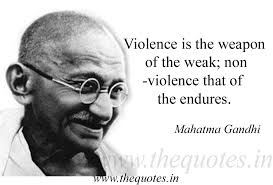 Gandhi believed in the force of non-violence.https://thequotes.in/violence-is-the-weapon-of-the-weak-non-violence-that-of-the-endures-mahatma-gandhi/Rather than portraying the flawed stereotypical definition of courage as a knight in shining armor, Gandhi manifested the spectacle of true courage throughout his life, which stems from his tenacious determination and exorbitant moral values and principles. Throughout Gandhi’s entire activist movement, he battled those who believed in resolving their problems with brute force and gratuitous violence. However, Gandhi was adamant about making oneself pure by omitting violence and bloodshed from one’s life. Instead, he believed in protecting people’s rights using words and boycotting goods. In fact, Gandhi believed that the idea of violence was the most dangerous idea ever created by the dexterity of mankind:
Gandhi believed in the force of non-violence.https://thequotes.in/violence-is-the-weapon-of-the-weak-non-violence-that-of-the-endures-mahatma-gandhi/Rather than portraying the flawed stereotypical definition of courage as a knight in shining armor, Gandhi manifested the spectacle of true courage throughout his life, which stems from his tenacious determination and exorbitant moral values and principles. Throughout Gandhi’s entire activist movement, he battled those who believed in resolving their problems with brute force and gratuitous violence. However, Gandhi was adamant about making oneself pure by omitting violence and bloodshed from one’s life. Instead, he believed in protecting people’s rights using words and boycotting goods. In fact, Gandhi believed that the idea of violence was the most dangerous idea ever created by the dexterity of mankind:
"Non-violence is the greatest force at the disposal of mankind. It is mightier than the mightiest weapon of destruction devised by the ingenuity of man. Destruction is not the law of the humans. Man lives freely by his readiness to die, if need be, at the hands of his brother, never by killing him. Every murder or other injury, no matter for what cause, committed or inflicted on another is a crime against humanity" (Gandhi 104).
When using violence as the solution to moral conflicts, the merit of triumph is nullified due to the nature in which the victory was procured. Thus, Gandhi advocated to instead solve problems using the amicable force of non-violence. Courage in the modern world is ironically portrayed as one who rushes into a building to save the baby, or a gallant knight avenging the cessation of his king. However, such examples do not embody the true definition of courage. Real courage is the ability to carry valor in one’s life while still upholding one’s own moral values. Gandhi was a imminent example of this. He showed true courage by continuing to take a stand against oppression while still making sure that no blood was spilled in the name of his cause. He managed to achieve what no other politician had been able to do in the last 20 years: unite India to take a stand for freedom without physically harming others. This unbridled and selfless courage is what truly makes Gandhi a heroic figure. Furthermore, Gandhi continued to portray his idealistic interpretation of courage, and how perseverance was an integral part of showing true courage. “A principle is a principle and in no case can it be watered down because of our incapacity to live it in practice. We have to strive to achieve it, and the striving should be conscious, deliberate and hard” (Mahatma Gandhi, Anand T. Hingorani, Ganga Anand Hingorani 46). Nothing valuable in life is given without a cost. In his memoir, Gandhi explains that without fully following a principle all the way through, regardless of the difficulty of the task, success cannot be obtained. True heroes take on difficult challenges and explore their options available in order to solve their problems. Perseverance through adversity is the first step to achievement of success. Gandhi frequently showed this very same mentality throughout his civil rights movement. For example, Gandhi once organized a protest in rural areas to spread awareness of his cause. However, the British easily stopped the peaceful protest and resorted to violence in order to contain the activists. Nevertheless, Gandhi immediately thought of an ingenious idea of going on hunger strikes, as well as boycotting all British products. Thus Britain's economy dipped and they had no other choice than to acknowledge India’s demands, which eventually ended the civil rights movement. Gandhi’s persistence illustrates true courage because in order to be truly courageous, one must be able to overcome adversity and obstacles and still find a way to achieve a desirable outcome.
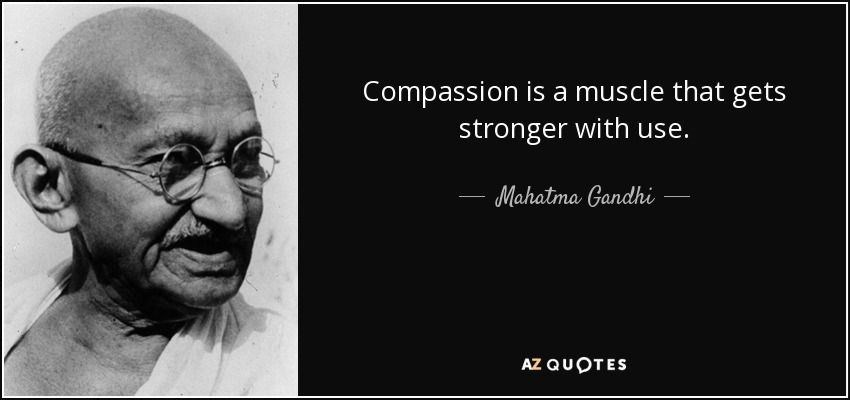 Gandhi believed compassion was a practice, not a state of being.https://i.pinimg.com/originals/01/f0/de/01f0de7aba89e325f2a0d04abe36760a.jpgGandhi exhibits compassion to all in his everyday life which allows him to become a relatable hero that can also act as a moral guide on how to navigate life. Gandhi believed in showing empathy to all he encountered, no matter who they were and what they believed in. He believed that all people deserved the opportunity to feel compassion and love from others, and that it was a necessary aspect to living life. In a speech to his followers, Gandhi said, “It is easy enough to be friendly to one's friends. But to befriend the one who regards himself as your enemy is the quintessence of true religion. The other is mere business” (To Every Englishman in India 2). Gandhi believed that in order to be compassionate, one had to imbibe the value of empathy in his life. When Gandhi gave this speech, his purpose was to try and teach others on the ways of life based upon his personal endeavours. He shows that with the power of compassion, one can become a true advocate of their values and beliefs and can become worthy of idolism. Gandhi believed in the spread of compassion which led to others being able to better themselves by also becoming compassionate allowing a benevolent and moral interaction to take place rather than pure aggression during strenuous and harsh times. Also, Gandhi believed in the spread of compassion through selflessness of one’s own self. Gandhi sacrificed his own physical health at times to ensure the progression of his movement which was only possible due to his abundance of compassion of those for which he was fighting for:
Gandhi believed compassion was a practice, not a state of being.https://i.pinimg.com/originals/01/f0/de/01f0de7aba89e325f2a0d04abe36760a.jpgGandhi exhibits compassion to all in his everyday life which allows him to become a relatable hero that can also act as a moral guide on how to navigate life. Gandhi believed in showing empathy to all he encountered, no matter who they were and what they believed in. He believed that all people deserved the opportunity to feel compassion and love from others, and that it was a necessary aspect to living life. In a speech to his followers, Gandhi said, “It is easy enough to be friendly to one's friends. But to befriend the one who regards himself as your enemy is the quintessence of true religion. The other is mere business” (To Every Englishman in India 2). Gandhi believed that in order to be compassionate, one had to imbibe the value of empathy in his life. When Gandhi gave this speech, his purpose was to try and teach others on the ways of life based upon his personal endeavours. He shows that with the power of compassion, one can become a true advocate of their values and beliefs and can become worthy of idolism. Gandhi believed in the spread of compassion which led to others being able to better themselves by also becoming compassionate allowing a benevolent and moral interaction to take place rather than pure aggression during strenuous and harsh times. Also, Gandhi believed in the spread of compassion through selflessness of one’s own self. Gandhi sacrificed his own physical health at times to ensure the progression of his movement which was only possible due to his abundance of compassion of those for which he was fighting for:
"Gandhi, Nehru, and other Congress leaders were imprisoned, touching off violence throughout India. When the British attempted to place the blame on Gandhi, he fasted three weeks in jail. He contracted malaria in prison and was released on May 6, 1944. He had spent a total of nearly six years in jail" (Mohandas Karamchand Gandhi 1).
Gandhi exemplifies the true meaning of selflessness to the highest degree. He endures countless hardship, after even risking the health of his own body, simply to achieve his goals. He choose to take a stand against coercion even while being wrongfully imprisoned. Being selfless directly relates to Gandhi being compassionate due the origin of which selflessness is acted upon. By being selfless, one is disregards himself for another person or idea, which shows an immense amount of love and respect towards that person. Because Gandhi acts upon his empathetic and selfless nature, he can be considered a compassionate which raises him to the title of a true hero.
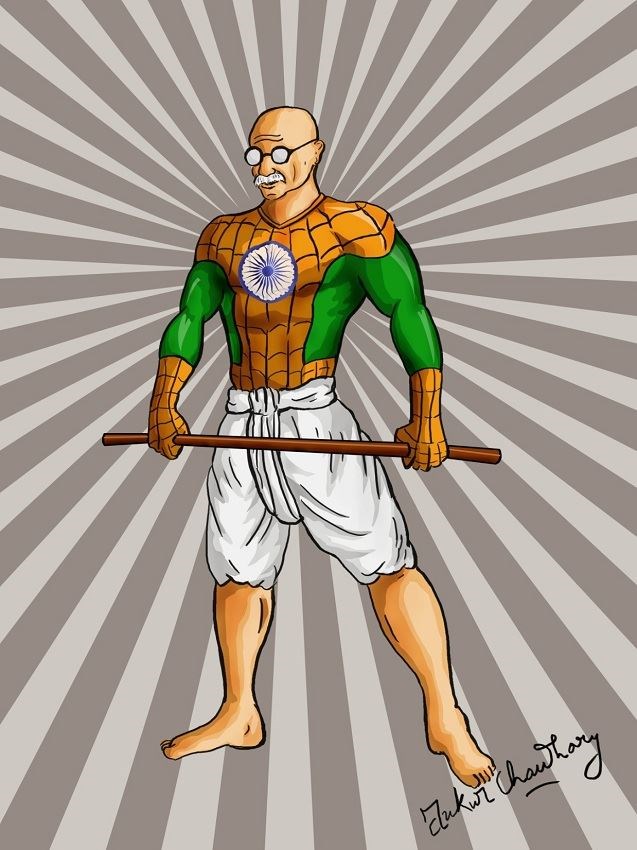 In today's modern era, Gandhi is considered India's first superhero.https://www.youthkiawaaz.com/2014/10/gandhi-as-superhero-ankur-chaudhary/A hero, by definition, is one who inclusively embodies moral and ethical values in order to reflect these values back onto the world. They overcome the struggles they face and turn into the epitome of hope for the future of mankind. They use their courage and compassion to revolutionize the minds of those they encounter. Heroes embody the humanitarian values that we wish to see in our world. They convert their flaws into tales of heroism and hope to support their idealistic traits. A hero in today’s world acts on what he believes and what he wishes to see in the world. Gandhi was a genuine example of a true hero, and his legacy continues through his actions in the past and impacts on the future. Gandhi never waited for others to act, and constantly achieved his goals, whether people stood by him or not. He believed in inspiring others through his actions, rather than just the words he spoke. He resisted violence and never supported it as a solution to the obstacles in one’s life. He sacrificed his physical health and gave up his own personal dreams because of his compassion for the people of India. In the end, he even lost his life fighting for his cause of providing freedom and love for all. His drive to continue to persevere and accomplish his goals in a nonconventional manner was what allowed him to become an inspiration to all around the world. His use of his mantle to reflect his values onto the outreached minds of the world is what allowed him to become worthy of a heroic stature in the hearts and minds of many around the world for generations to come.
In today's modern era, Gandhi is considered India's first superhero.https://www.youthkiawaaz.com/2014/10/gandhi-as-superhero-ankur-chaudhary/A hero, by definition, is one who inclusively embodies moral and ethical values in order to reflect these values back onto the world. They overcome the struggles they face and turn into the epitome of hope for the future of mankind. They use their courage and compassion to revolutionize the minds of those they encounter. Heroes embody the humanitarian values that we wish to see in our world. They convert their flaws into tales of heroism and hope to support their idealistic traits. A hero in today’s world acts on what he believes and what he wishes to see in the world. Gandhi was a genuine example of a true hero, and his legacy continues through his actions in the past and impacts on the future. Gandhi never waited for others to act, and constantly achieved his goals, whether people stood by him or not. He believed in inspiring others through his actions, rather than just the words he spoke. He resisted violence and never supported it as a solution to the obstacles in one’s life. He sacrificed his physical health and gave up his own personal dreams because of his compassion for the people of India. In the end, he even lost his life fighting for his cause of providing freedom and love for all. His drive to continue to persevere and accomplish his goals in a nonconventional manner was what allowed him to become an inspiration to all around the world. His use of his mantle to reflect his values onto the outreached minds of the world is what allowed him to become worthy of a heroic stature in the hearts and minds of many around the world for generations to come.
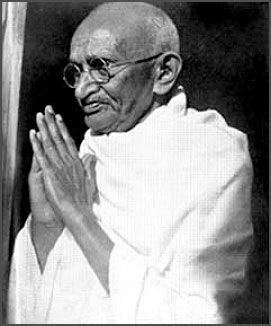 Gandhi was a man who purely believed in peace and liberation for his country.https://i.pinimg.com/originals/bb/9e/fc/bb9efceb2cda0aec8b438b95e3ce5f35.jpg
Gandhi was a man who purely believed in peace and liberation for his country.https://i.pinimg.com/originals/bb/9e/fc/bb9efceb2cda0aec8b438b95e3ce5f35.jpg
Works Consulted
Gandhi, Mohandas Karamchand, and Anand T. Hingorani. The Encyclopaedia of Gandhian Thoughts. All India Congress Committee, 1985.
Gandhi, and Krishna Kripalani. All Men Are Brothers. Columbia University Press, 1958.
Granger, David. "Boy, Do We Ever Need a Hero." Esquire, vol. 130, no. 5, Nov. 1998, p. 26. EBSCOhost, search.ebscohost.com/login.aspx?direct=true&db=aph&AN=1220165&site=ehost-live.
“Mohandas Gandhi on Befriending Enemies.” Georgetown University, berkleycenter.georgetown.edu/quotes/mohandas-gandhi-on-befriending-enemies.
"Mohandas Karamchand Gandhi." Encyclopedia of World Biography, Gale, 1998. Biography In Context, https://link.galegroup.com/apps/doc/K1631002423/BIC?u=powa9245&sid=BIC&xid=41a6bbdf. Accessed 15 Apr. 2018.
To Every Englishman in India | Literature.syzygy.in. www.bing.com/cr?IG=114383DD3D9044C08107A20C34B6D1BF&CID=3711E040952C6C131F6FEBBF94D16D44&rd=1&h=YERr8_oaGPzAdoxqMFQx3fYbY70s_JF-d4F7Z2Mbuo0&v=1&r=https://literature.syzygy.in/freedoms-battle/non-co-operatation/every-englishman-india&p=DevEx.LB.1,5701.1.
Page created on 5/30/2018 12:23:45 AM
Last edited 6/13/2018 9:27:10 PM
